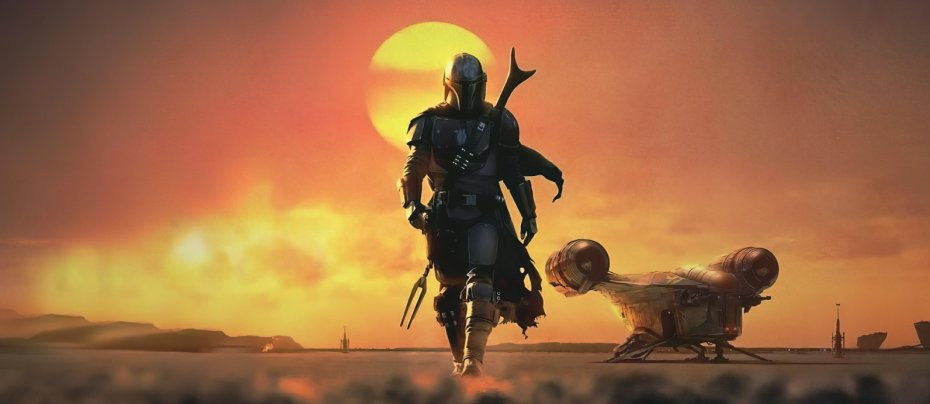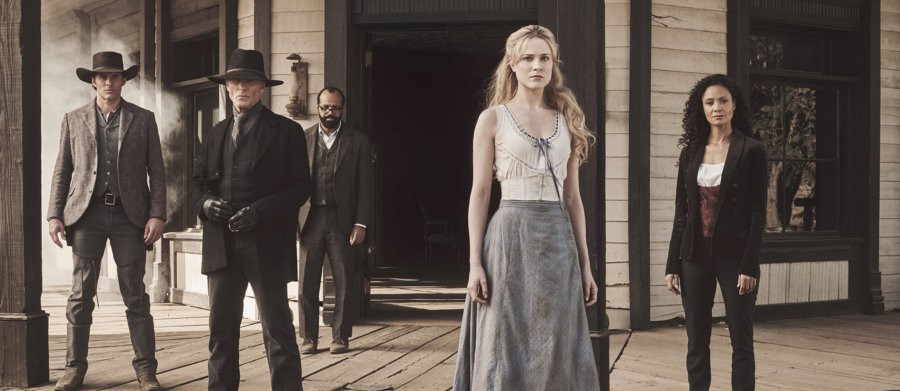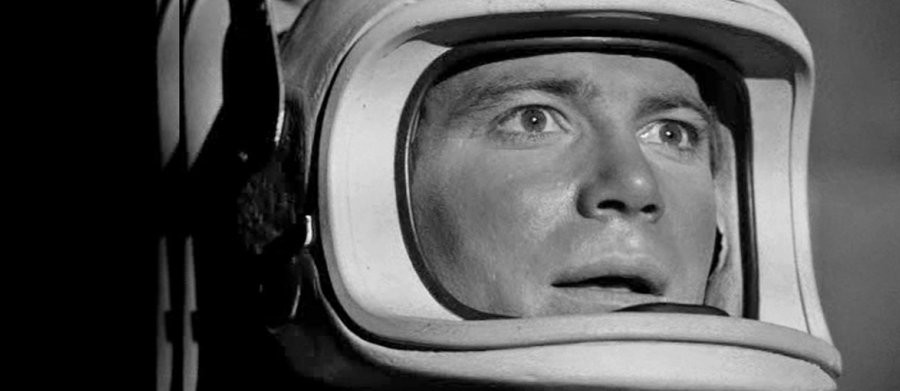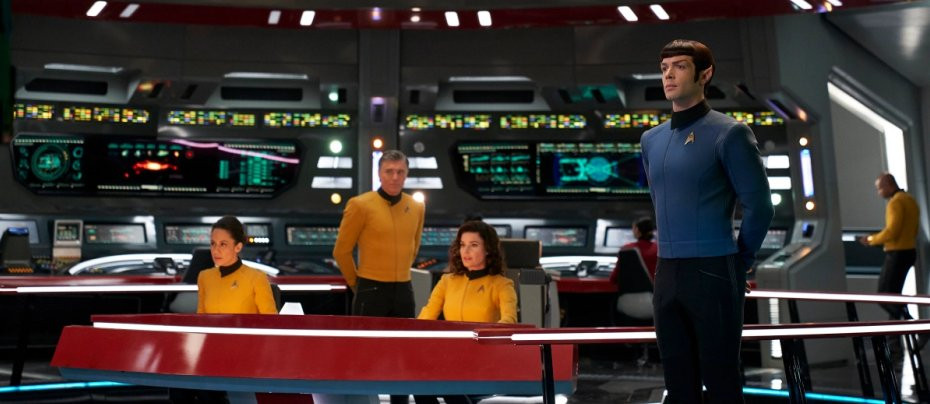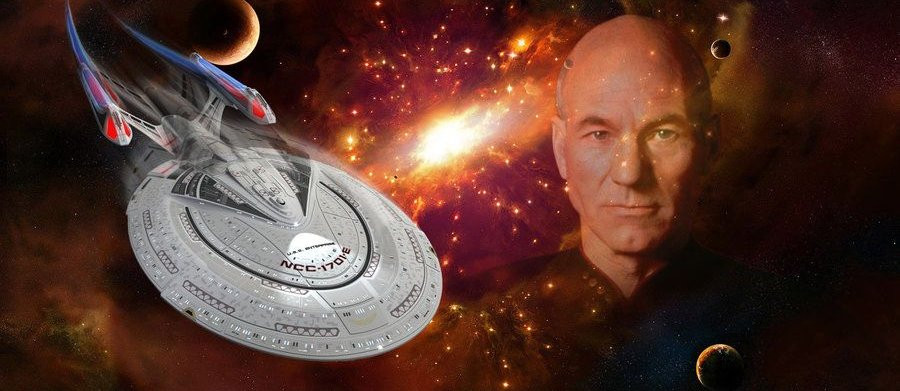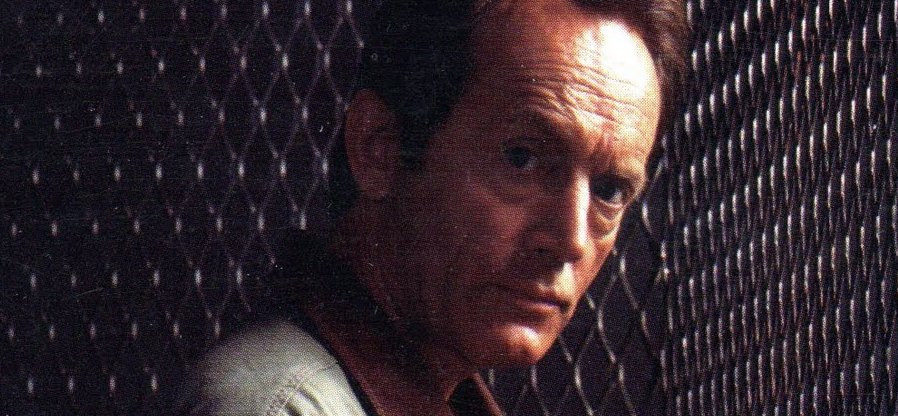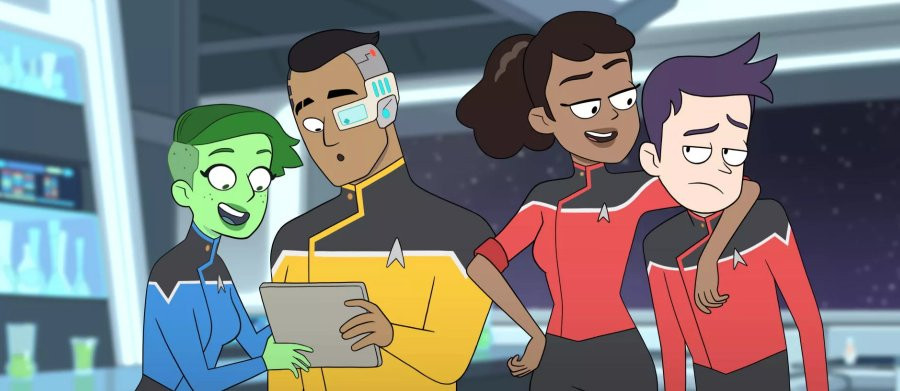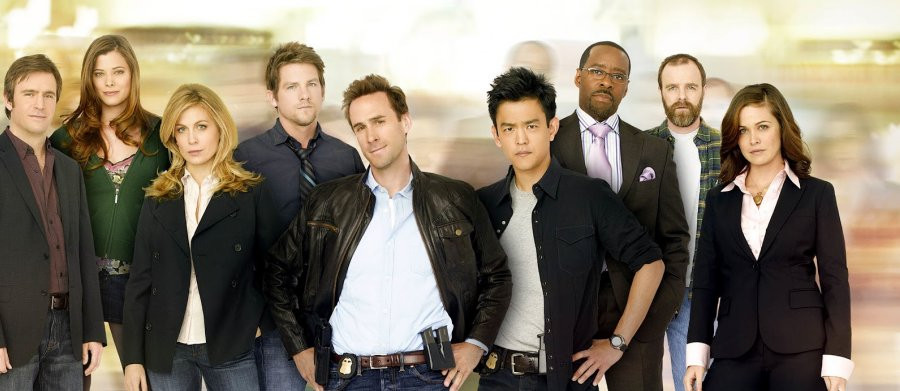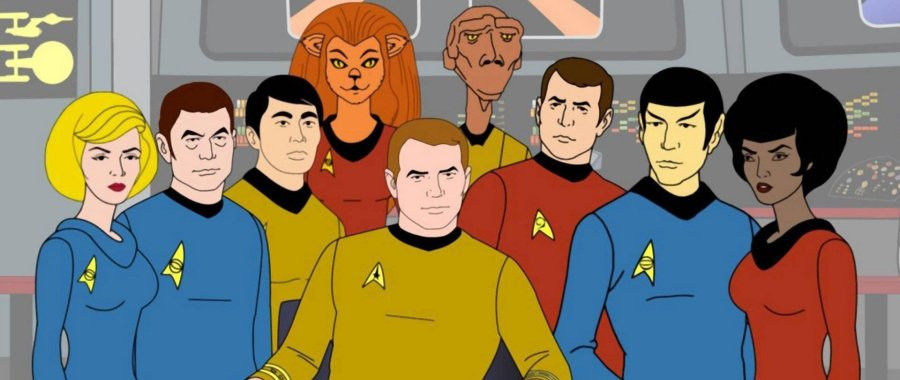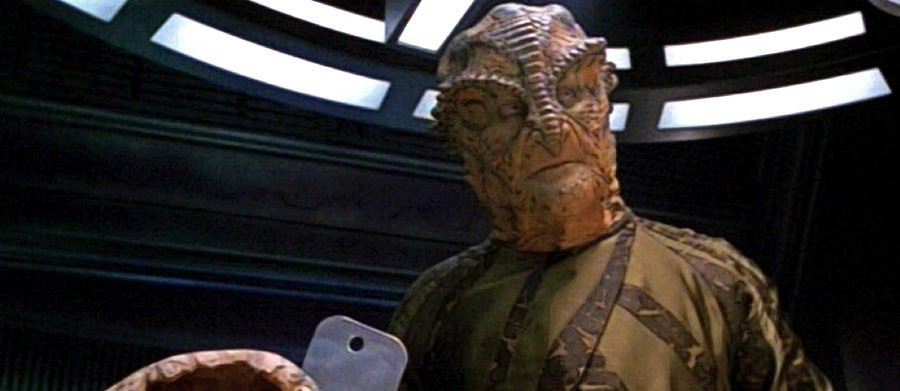
The Best Of...Star Trek Voyager - "Distant Origin"
by Daniel Tessier
Star Trek: Voyager is far from my favourite series in the Star Trek franchise. It features a great deal of what I would consider filler episodes, which are perfectly acceptable background entertainment but make little impression. In amongst those, though, are some real diamonds, based on some fascinating science fiction concepts. And so it is that my favourite episode in all of Star Trek is actually an instalment of Voyager.
One thing I've loved since childhood, as much as the stars and planets of the universe, is dinosaurs. So a story that combines the two was always going to appeal to me. Late in the third season, " Distant Origin" sees a powerful alien civilisation encounter the starship Voyager and wrestle with the revelation that they're from the same planet. In the process, the episode calls into question our own attitudes to both science and faith.
"Distant Origin" is a unique episode, shot in quite different style to the rest of the series. David Livingston (who directed 62 episodes in the franchise and contributed so much to Star Trek that Captain Picard's pet fish was named after him) directs the episode in a rich and dynamic style, focusing on deep, low-down and close-up shots that skew the perspective. This is a strong technique, used when we're focusing on the aliens' point of view, with the style slipping back to a more conventional style when the Voyager crew are the focus.
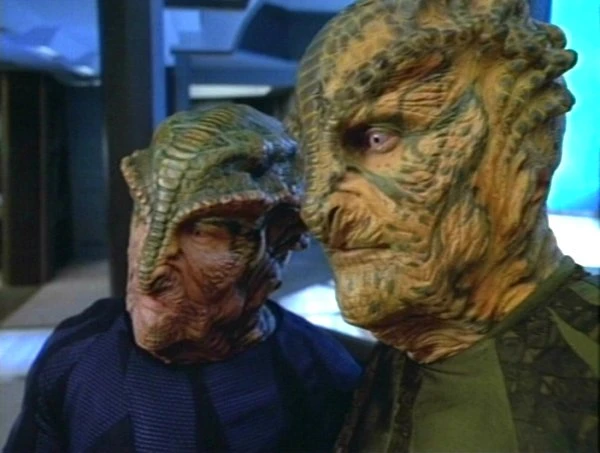
More significantly, though, the focus is rarely on the regulars, who don't even appear until fourteen minutes into the episode – a third of the way in, and well into the second act. The episode instead begins following the aliens of the week, the Voth. Tall reptilian beings, the Voth have a thick claws on their hands, and a pronounced crest sweeping back from their heads, hinting early on at their origins. They're proudly reptilian, too – catching insects with a flick of their tongues, communicating partly through colour changes on their skin. This second element is spoken about rather than seen, but there's clearly a bit of the chameleon to their concept. They even disdain "non-saurian" life forms, particularly mammals, which they consider unsophisticated. Also, we smell.
However, the Voth are also an ancient and rigidly constrained people, with a culture that dates back over twenty million years. They maintain a strict system of castes and family ties, and live their life according to their holy doctrine. They claim inalienable sovereignty over the region of space they inhabit – remember, Star Trek: Voyager is set in the distant Delta Quadrant, thousands of light years from Earth. They believe they were the first civilisation to evolve in that region of space, a belief that is at the very core of their culture.

The episode follows the quest of Dr. Forra Gegen, a prominent scientist among the Voth, who has collected evidence that suggests the Voth actually evolved on a far off world – his Distant Origin theory. The episode begins with Gegen and his assistant Veer uncovering the skeletal remains of a human member of Voyager's crew on an arid planet. It's a nice moment of continuity – the body belongs to a character who was killed off by a monster in the season opener – and also provides us with the irresistible visual of a couple of dinosaurs digging up human bones. The remains are the final clinching proof that Gegen needs to prove his theory, with a huge amount of genetic material in common with the Voth.
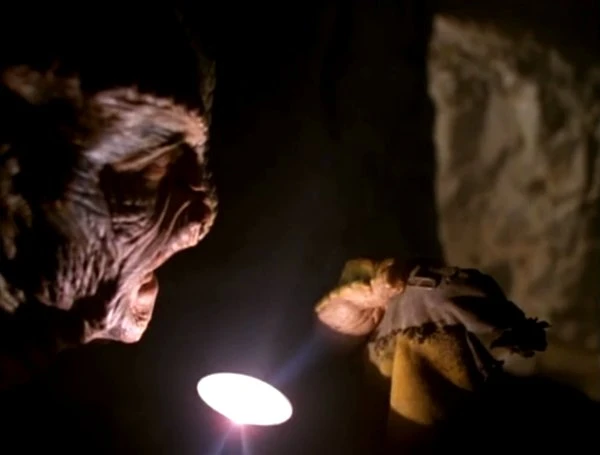
However, the Voth elders refuse to accept the evidence. Accusing him of heresy, they force him to go on the run, searching for the starship that the mysterious body once came from. The central concept for the episode – beyond dinosaurs in space, that is – was to see the Galileo figure of an alien culture. Gegen is that figure, his scientific breakthrough held back by a religious autocracy who fear their beliefs and way of life are under threat.

It's a fascinating concept, and the script, by two of the showrunners, Brannon Braga and Joe Menosky, is a well-written and powerful exploration of it with some strong dialogue. Without Livinstone's direction, though, it would lack the same impact. The episode's greatest strength, though, is its actors, particularly Henry Woronicz as Gegen. In spite of being buried under one of the most all-consuming make-up jobs in all of Star Trek, Woronicz gives a powerful, heartfelt performance as a man driven by his belief in the truth of science. Woronicz had previously played the Klingon criminal J'Dan in the highly acclaimed 1991 episode of The Next Generation , "The Drumhead ," and would return to Voyager the following season as Quarren in "Living Witness," another excellent episode. Other TV roles include appearances in Quantum Leap, Frasier and Law and Order .

When they track down Voyager, Gegen and Veer beam aboard the ship, invisible and intangible thanks to an incredibly sophisticated cloaking device, observing the crew and making comments as if this was a nature documentary on BBC2. Amusingly, they deduce that human society must be a matriarchy since Janeway is in command. The primitive humans prove more resourceful than the Voth scientists expect, and uncover their presence. In the panic that follows, Veer is captured by the crew while Gegen beams away with Chakotay. Now, Chakotay episodes are rarely stand-outs, but Robert Beltran is excellent here, sharing a strong rapport with Woronicz as Gegen. It's good to have a script that remembers Chakotay is a scientist and an anthropologist, and explores the impact of discovering another civilisation that began on Earth.
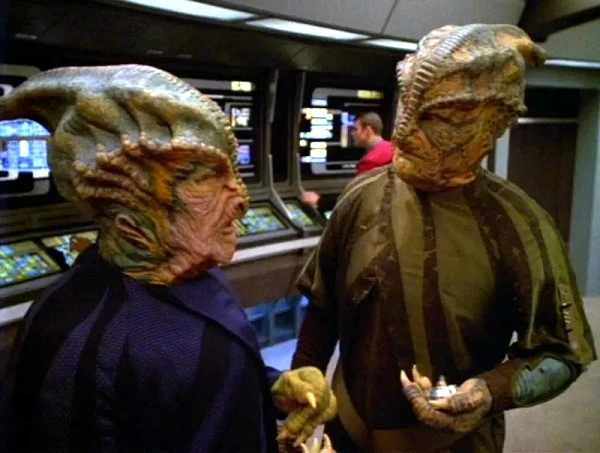
On Voyager the crew come to the same conclusion as Gegen, and are able to use their database to confirm that the Voth evolved from dinosaurs – specifically hadrosaurs, often known as duck-billed dinosaurs. (In fact, the dinosaur illustrated is of the genus Parasaurolophus, displaying the impressive head crest that continues in the Voth make-up.) There's some dodgy science on display in the episode. The idea that most dinosaurs were cold-blooded was still largely accepted at the time, but was already fallen from favour and has been discredited now. Other scientific errors are simply that, and there could have been a little more attention paid to research, but I guess most people watching wouldn't have been as pedantic as a dinosaur enthusiast in his early teens.
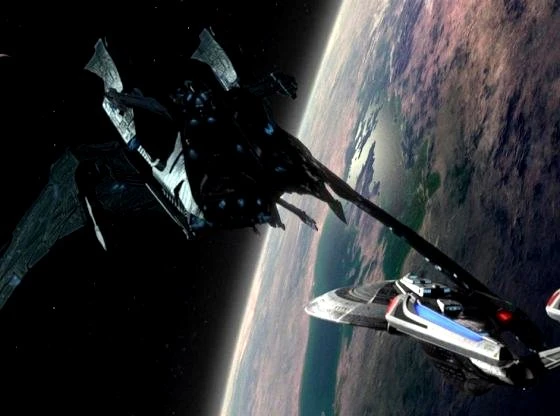
Events go poorly from there for both the humans and Gegen. The Voth have technology millions of years ahead of the Federation, and their City Ship – a rather elegant design by Rick Sternbach – appears out of nowhere. Voyager has come up against some powerful threats before, but we've never seen them so hopelessly outgunned. The Voth ship simply beams Voyager directly into its cavernous belly and shuts down its systems. The crew are totally helpless. Gegen and Chakotay are captured, and the scientist is given a sham trial in which it's clear the ruling elders have no interest in the truth. There's a very strong performance by Concetta Tomei (‘China Beach’, ‘Providence’) as Odala, the Chief Minister, who is sneeringly arrogant throughout.

In spite of impassioned speeches by both Gegen and Chakotay, Odala threatens to imprison not only the scientist but the entire Voyager crew, forcing Gegen to recant his claims. While it began as a riff on Galileo's historical persecution, there's a clear parallel to the ongoing battle between creationists and evolutionists in Christian society, something which has troubled the United States in particular. The ongoing discrediting of science and the backwards slide into religious fundamentalism that continues to hold back society makes the episode more relevant today than ever.
Combining a strong script, fine direction, excellent central performances and some exceptional design work, " Distant Origin" is a stand-out episode that stands head-and-shoulders above most instalments of Star Trek: Voyager and is a highlight of the whole franchise. It's message of trust in science and the importance of an open mind is powerfully communicated, and one we should heed as we go further into the future – eyes open.
About Daniel Tessier
Dan describes himself as a geek. Skinny white guy. Older than he looks. Younger than he feels. Reads, watches, plays and writes. Has been compared to the third, fourth, fifth, sixth, seventh, eighth, tenth, eleventh and twelfth Doctors, and the Dream Lord. Plus Dr. Smith from 'Lost in Space.' He has also had a short story published in Master Pieces: Misadventures in Space and Time a charity anthology about the renegade Time Lord.
Dan's web page can be here: Immaterial
Published on October 15th, 2020. Written by Daniel Tessier for Television Heaven.


